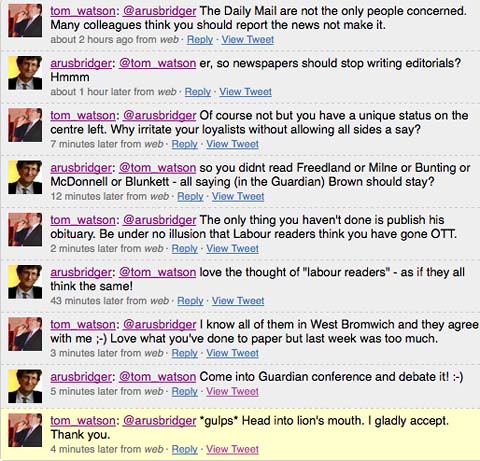Bloggers and journalists discussed their shifting roles and relationships in the context of online political blogging at Monday’s Voices Online blogging conference at City University, organised by the Next Century Foundation.
Blogging is improving the quality of journalism by forcing reporters to be more honest about their sources the Guardian’s senior political correspondent, Andrew Sparrow, said yesterday.
Sparrow said that traditional journalistic secrecy had become ‘hard to justify in the blogosphere’ because readers act as ‘particularly aggressive sub-editors’.
“There’s an expectation that you will be more upfront about your sources, and that’s a good thing,” he said.
“In a conventional news story, you can never own up to doubt. In a blog, it’s perfectly acceptable to say what you know and what you don’t know.”
Sparrow also suggested that political bloggers have raised the bar of competition for traditional news organisations.
“I don’t see myself as part of the blogging community in the way that Paul Staines or Nick Fielding are,” he said. “I view blogging as a tool that we use [at the Guardian] for our mainstream journalism. But I worry if the amateurs are doing it better than we are.”
However, in an earlier panel, Paul Staines questioned whether drawing a distinction between ‘journalist’ and ‘bloggers’ is still relevant.
“How long is it before we stop asking that question?” he said. “With converging digital platforms, there may no longer be a difference.”
Sparrow, who has previously reported on the political arena for the Daily Telegraph and the Daily Mail, said that he had been frustrated by ‘the limited way you could tell stories’ in traditional print media.
“The internet has an immediacy that you don’t always get in mainstream media. I like the commentability, but it makes many journalists uncomfortable,” he said.
He added that digital media has improved the range of sources available to journalists. “Once, you might have had to spend the morning ringing ten people to find out what they thought about something, whereas now, you can subscribe to ten RSS feeds,” he said.
However, Sparrow also said that the Guardian ensures its blogs ‘report in accordance with its journalistic values and the public interest’, and acknowledged that the wider blogging community ‘survives on subjectivity’ which is at odd with traditional journalistic notions of balance.
But Mick Fealty, creator of the Slugger O’Toole blog and who also blogs at the Telegraph and the Guardian sites, insisted this did not compromise the quality and integrity of blogging. “The journalists who make good bloggers are the ones who know they’re only interjecting into a larger conversation. There is a value in being challenged,” he said.
“Truth is more useful than balance. One truth at a time is enough.”
Journalism.co.uk reported live from the Voices Online Blogging conference 2009. Follow @journalism_live on Twitter for updates from a wide array of media events.
